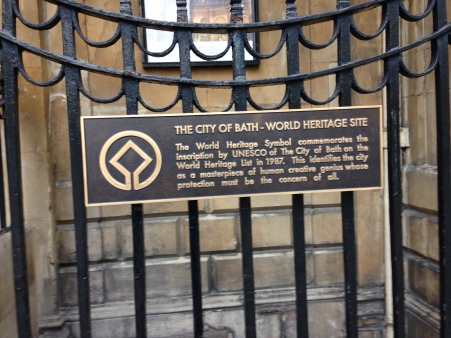
I was really pleased to be invited to assist the City of Bath World Heritage Site team with their part of the nomination bid process as part of the serial transnational tentative world heritage site; the ‘Great Spas of Europe’.
Like every specialised area, the business of World Heritage is full of jargon and technical terms.
The City of Bath is already ‘inscribed’ as a World Heritage Site (30 years ago this year) and is one of 1,052 (as of 2016) sites to be given this accolade.
The business of bidding to be added to this list is long and time consuming (you wouldn’t want it to be too easy after all) and the applicant, in theory the national government or ‘State Party’ but, in fact local people with passion and belief, have to complete a lengthy nomination document. In this dossier the State Party have to demonstrate that their city or heritage site is up there with the best and deserves to have recognition as a heritage asset of ‘Outstanding Universal Value*’ i.e. it is important not just to the local community or nation but to the whole of humanity.
The work gets much more complicated when you make a bid for a ‘serial transnational’ site. This means a site that has more than one location and transcends national boundaries. An example of this is the Frontiers of the Roman Empire World Heritage Site. This includes Hadrian’s Wall, the Antonine Wall and the Limes of the Roman Empire in Germany.

Each of the 7 nations and 11 sites that make up the Great Spas of Europe has a fascinating story to tell as meeting places, places of learning, healing and pleasure. The sites have to collectively demonstrate that they are worthy of being added to the World Heritage List by meeting one or more of the 6 criteria for cultural world heritage sites.
The City of Bath has a 2,000 year history of healing from the Celtic culture, through the Roman period to the Benedictine community of the Middle Ages and to the Corporation of the hey-day of the eighteenth and early nineteenth centuries (think Jane Austen). I can’t claim to have done the research myself, others claim the credit for that, but it has been fascinating to learn about the characters who came to Bath and its hot springs drawn by the distractions and diversions as well as its reputed healing powers as I pulled together the draft City of Bath’s Management Plan as a component part of the Great Spas of Europe.
I’ve really enjoyed finding out more about Bath and its place in history whilst preparing the draft management plan. Bath had the first purpose built hotel outside of London and it’s impact on town planning and diagnostic medicine should not be underrated. Tourism and holidays were pioneered by Bath and the other towns of the Great Spas of Europe opening up the whole idea of rest and recreation for the new middle classes.
The work continues on the nomination bid and I look forward to following its successful conclusion.
As a former Stonehenge World Heritage Site Coordinator, member of the World Heritage UK Board and currently their Finance Manager I am able to advise and support on World Heritage issues. Contact me!
*49. Outstanding Universal Value means cultural and/or natural significance which is so exceptional as to transcend national boundaries and to be of common importance for present and future generations of all humanity. As such, the permanent protection of this heritage is of the highest importance to the international community as a whole. The Committee defines the criteria for the inscription of properties on the World Heritage List. [Operational Guidelines 2016)


